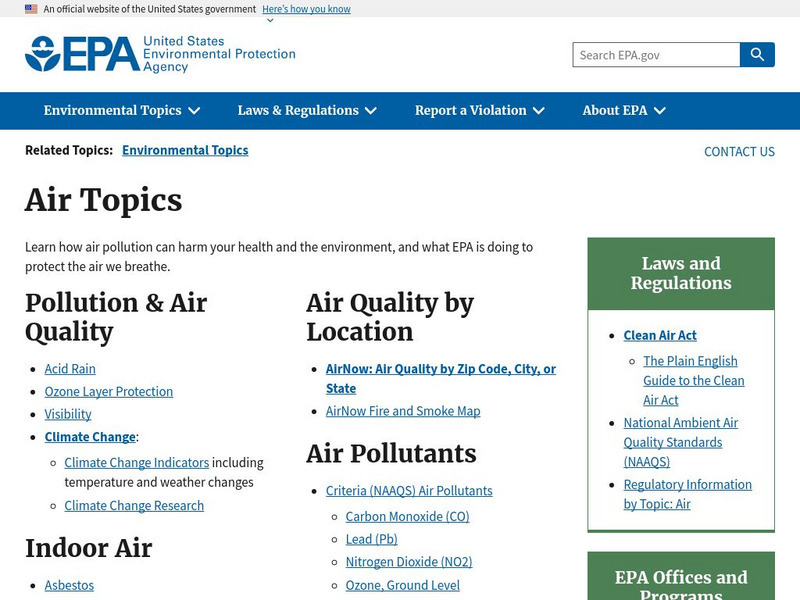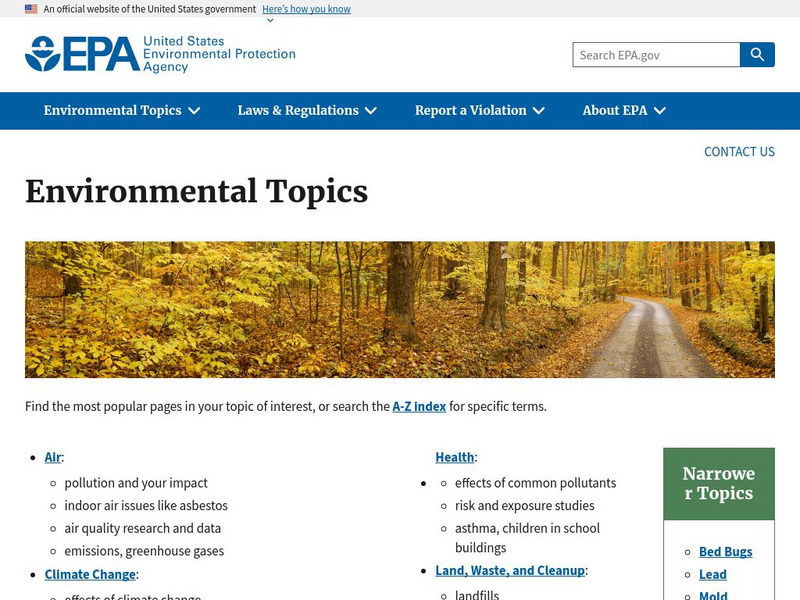Hi, what do you want to do?
Curated OER
Designing a Tropical Reserve System
Students explain the complexity of resource, land use, and conservation decisions.
Curated OER
Contaminated Water
Students review and use the steps in the scientific method to complete the experiment. In groups, they research the importance of water to plants and animals in their local area. They examine how water can become contaminated and take...
Curated OER
Energy Audit
Students examine the level of energy usage on a local and national level. Using the internet, they discover ways to conserve energy every day and how over-consumption of energy negatively affects the environment. In groups, they...
Curated OER
Invasive Species
Learners use the Internet to research non-native plants that exist in their local community. Using this information, they analyze the invasive species effect on their environment. In groups, they plan and execute their own project to...
Curated OER
Take a Dip: The Water in Our Lives
Pupils explore the function of storm drains and the importance of keeping them clean of debris. They obtain permission from local authorities and perform community service painting stenciled messages near existing storm drains.
Curated OER
What Are the Ethical and Legal Aspects of Radon?
Young scholars research a legal or ethical aspect of radon. They create their own legislation regarding radon and real estate. They present their information to the class.
Curated OER
Introducing the Incredible RBT-2000
Fourth graders construct a miniature robot using recyclable materials. They write a descriptive explanation from the robot's point of view explaining how it aid in protecting the environment.
Curated OER
What Do You Think About Radon?
High schoolers complete a survey about radon in their homes. They calculate the averages for each question. They graph the averages and discuss the results.
Curated OER
Preventing Lead Poisoning in Children
Students examine the problem of children being poisoned by lead in the United States. After discussing the uses of lead, they brainstorm a list of ways they can be poisoned by the substance. In groups, they discover how they can stay...
Curated OER
Great River Bend Adventure
Young scholars use their imagination. They discuss the 4 C's of teamwork: Concentration, Communications, Coomperation, and Consideration. Students discuss the safety guidelines of the project. They complete a rope maze. The group walks...
Curated OER
A Long Time Ago in the Future
Learners read and discuss Canadian young adult literature. They compare/contrast the elements of citizenship, characterization, and themes, write journal responses, and identify the elements that define Canadians.
Curated OER
Can I Take Action?
Students create a solution to a problem related to the environment. They work together to develop the plan and pitch the plan to their class. They discuss the action steps taken in a story they were read.
Curated OER
Finding Buck Henry
Students read and demonstrate competence in the general skills and strategies of the writing process via the novel "Finding Buck Henry." They recognize complex elements of plot. Students analyze devices used to develop characters in...
Curated OER
Language Arts: How Can Research Shape Ideas?
Students are able to characterize arsenic and determine its potential health threats in writing. They are able to compare and contrast arsenic to other water pollutants using Venn diagrams. Students are able to demonstrate essay skills...
Curated OER
Identifying Wetlands
Students describe three major categories of indicators that are used to delineate wetlands. In this wetlands instructional activity students visit a wetland and make observations then complete an activity using the soil.
Curated OER
Human Activity and Cllimate Change
Pupils perform activities to explore the affect of human activity on climates. They examine graphs of GHG emissions and their increases that are associated with human activity. Using a Global Climate Changing website, students explore...
Curated OER
Nuclear Storage on the Goshute Reservation
Learners discuss weather or not the Goshutes should be allowed to store nuclear waste on their reservation. They work in groups and research an assigned topic, locate relevant sources then present their investigation to the class
US National Archives
Docsteach: Birth of the Environmental Protection Agency (Epa)
By the late 1960s, issues of unchecked land development, urban decay, and air, noise, and water pollution came to Americans' attention. In November 1971, the newly created Environmental Protection Agency (EPA) announced a large-scale...
Annenberg Foundation
Annenberg Learner: Habitable Planet: A Systems Approach to Environmental Science
Interdisciplinary multimedia course, in thirteen units, on environmental science. Each unit encompasses a thirty-minute video, an accompanying textbook chapter, and an array of visuals and animations. With five interactive labs, a...
Thinkport Education
Maryland Public Television: Enviro Mysteries
This engaging site will allow students to develop informed thoughts and ideas on contemporary environmental health issues through videos, interactive programs, and documents.
Science Education Resource Center at Carleton College
Serc: Epa's Environmental Education Center
A collection of fact sheets, brochures, and web pages about environmental issues. Topics include acid rain and air pollution, ecosystems, human health, waste and recycling, conservation, and water-related concepts and issues.
US Environmental Protection Agency
Epa: Learn the Issues: Air
Air pollution occurs both inside and outside and is dangerous to individuals as well as to the planet. The Environmental Protection Agency oversees laws and regulations related to air quality and has gathered a wealth of information to...
US Environmental Protection Agency
Epa: Important Issues
This official site for the EPA describes the issues of the day. Learn about topics such as water, air, climate, wastes and pollution, green living, and more. Find important ways that you can get involved in protecting the environment.
National Institutes of Health
Niehs: Kids' Pages
Learn about keeping our environment clean with the National Institute of Environmental Health Sciences' Web Page. There are web resources for environmental issues, games and activities and coloring pages, too.




























